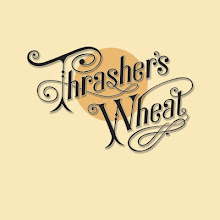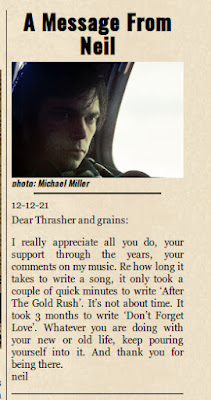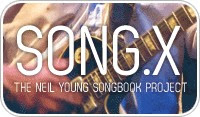WALL-e: Life After The Goldrush

We don't generally cover movies here at Thrasher's Wheat that are non-Neil or not related to music. And especially a children's film by the Disney CORPORATION.
So it may come as a surprise that we're mentioning that Thrashette and I ventured out this weekend to see the film WALL-e. Quite simply, WALL-e is a vision of life after the goldrush.
But the only thing we can really say is that seeing Wall-e may help visualize the post-apocalyptic world that Neil Young sings about in "After The Goldrush" (lyrics analysis).
From Climate Progress review "Wall-E is an eco-dystopian gem — an anti-consumption movie (from Disney!)":
Disney/Pixar’s new hit Wall-E is easily one of the best movie dystopias ever. It ranks with Blade Runner, Brazil, A Clockwork Orange, Mad Max Beyond Thunderdome, the Matrix, Planet of the Apes, Soylent Green, and the first two Terminator movies.I have a couple of reasons for writing about the movie. One is that we can expect to see more environmental dystopias as the painful reality of global warming becomes more and more obvious to all. Wall-E makes clear that even the most brutal satire of our self-inflicted environmental predicament can be a box office success, if it is well done. The second reason is the incredible irony of Disney making this movie.
As a film it is superb, a must see for children and adults. Critically acclaimed, it received a rare 97% on Rotten Tomatoes. The New Yorker’s tough-to-please David Denby writes:
This may be the only major movie ever made that is both a dystopia and anti-utopia. In the dystopic first half, we see a lifeless post-eco-apocalyptic Earth overrun by toxic garbage, which is collected and compacted by our robotic hero, WALL-E (Waste Allocation Load Lifter-Earth-Class). WALL-E has become sentient by collecting and studying the waste of humanity, including an old tape of the movie Hello Dolly he plays over and over again.
In the anti-utopic second half, the megacorporation Buy ‘N Large had created a seeming paradise for humans on board “Executive Starliners” where every task has become automated. But hundreds of years after what was supposed to be a brief exodus while Earth was cleaned up, humans have become “a flabby mass of peabrained idiots who are literally too fat to walk.” These lazy, overweight video-addicts — whoever could the moviemakers be talking about? — are less human than WALL-E.
Though criticized by some conservatives as anti-capitalist, WALL-E is perhaps best described as one of the most anti-consumption movies ever made. That’s why even Michael Gerson, a Former Bush speechwriter known for his evangelical moralism, loved the movie and saw it as a daring attack on “a culture of consumption.”
As much as I loved the movie, I did find an odd disjunction….
Yes, the movie is a brutal satire on “self-involved consumption.” But if we are looking at who in the world is responsible for self-involved consumption, for the global homogenization of mass consumerism, for instigating the shop-until-you-drop culture at an early age, surely Disney itself would be on the short list.
Our culture is going to undergo a remarkable transformation over the next few decades. Either we will proactively embrace an efficiency, conservation, and clean energy revolution starting in the first term of the next president. Or a culture of scarcity will be forced upon us sometime during Planetary Purgatory (see “Anti-science conservatives must be stopped“). I am not so rosy-eyed as to see the former as a utopia, but the latter will most certainly be a dystopia grim as any ever envisioned.
After leaving the theater, we could somehow hear Neil's song "Mother Earth" wafting about the airwaves. And we mention this in the context that we heard a number of reviewers of the Europe summer tour mention that they were not particularly enamored with Neil's performance of "Mother Earth" at huge outdoor concert festivals. That somehow "Mother Earth" didn't fit into the setlist of vintage songs mixed with the newer Chrome Dreams material.
We would argue that songs such "Mother Earth" and "After The Goldrush" are more relevant than ever. The restless consumer meets Buy-N-Large.
So check out WALL-e. It's not a piece of crap.
Afterall, the inconvenient truth of Greendale is that Sun Green was right.































 Human Highway
Human Highway

















 Concert Review of the Moment
Concert Review of the Moment





 This Land is My Land
This Land is My Land

 FREEDOM In A New Year
FREEDOM In A New Year









 *Thanks Neil!*
*Thanks Neil!*




![[EFC Blue Ribbon - Free Speech Online]](http://www.thrasherswheat.org/gifs/free-speech.gif)











 The Unbearable Lightness of Being Neil Young
The Unbearable Lightness of Being Neil Young Pardon My Heart
Pardon My Heart



 "We're The Ones
"We're The Ones  Thanks for Supporting Thrasher's Wheat!
Thanks for Supporting Thrasher's Wheat!




 This blog
This blog 
 (... he didn't kill himself either...)
#AaronDidntKillHimself
(... he didn't kill himself either...)
#AaronDidntKillHimself









































































 Neil Young's Moon Songs
Neil Young's Moon Songs




 Civic Duty Is Not Terrorism
Civic Duty Is Not Terrorism Orwell (and Grandpa) Was Right
Orwell (and Grandpa) Was Right


 What's So Funny About
What's So Funny About 



4 Comments:
After seeing Neil twice this summer i must say i thought that Mother Earth was one of the highlights in both concerts. It gave me a chill up and down my spine. I thought it fit well, even at the festival (Roskilde). Relevant as ever, honest and beautiful.
The Ragged Glory version of Mother Earth, with its direct message & howling guitar, seemed like a rallying cry: a call to action.
Nearly 20 years later the organ & harmonica version at the Hop Farm festival seemed mournful: The fact that the lyrics are still valid, maybe even moreso now, says a lot.
What also says a lot is that the song was lost on a number of the crowd, who seemed to prefer to watch the big screens as the cameras panned around them, gurning to great applause if they caught a glimpse of themselves. Do any of these people really care about environmental issues?
I've got to agree, it's really futile to pick highlights from a whole gig that's a highlight but, at Dublim for me Words and Mother Earth stood out. Mother Earth in particular was haunting and made the hairs on the back of my neck stand up (more than the rest!).
And, of course, my apolgies to the good citizens of Dublin (m).
Post a Comment
<< Home